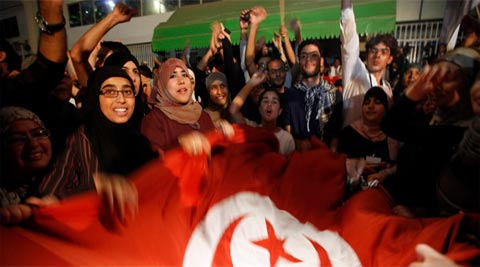Stay updated with the latest - Click here to follow us on Instagram
Why Tunisia is succeeding
The three numbers to keep in mind in the Arab world today are 1,5,000 and 500,000.
The three numbers to keep in mind in the Arab world today are 1,5,000 and 500,000.
IF you’re confused about all the turmoil in the Arab world and asking how the United States should respond, I find it useful to consider three questions: One, why is it that the Arab awakening country where the US has had the least involvement, Tunisia, is where the most progress is being made towards building a consensual democracy? Two, why are the three most important numbers to keep in mind when thinking about the Arab world today 1, 5000 and 500,000? Three, why does Egypt’s strongman, General Abdul-Fattah el-Sisi, have so many medals on his chest when he’s too young to have fought in any of Egypt’s big wars, and why might that be a worrying sign? Let’s start with Tunisia, where the country’s National Constituent Assembly has forged a new Constitution that, as The Times reported, “is a carefully worded blend of ideas that has won the support of both Ennahda, the Islamist party… and the secular opposition.” It is surely one of the most liberal and inclusive constitutions in the Arab world.
What’s the secret?
Answer: The main religious and secular forces in Tunisia, after coming close to civil war, finally agreed to the sine qua non for the success of any Arab democracy movement — “No victor, no vanquished.” But Tunisians had another advantage, says Craig Charney, a veteran pollster in South Africa and the Middle East. Tunisia “already had strong civil society institutions” — like the General Labour Union, the National Business Federation, the Tunisian Bar Association and the Tunisian Human Rights League. These institutions, explained Charney, “were able to play a non-partisan moderating role between the different political factions.” And, unlike Egypt, Tunisia also did not have a politicised military with deep roots in the economy that had incentives to meddle in the political arena. Syria, Libya and Iraq had no real civil society institutions at all.
And that leads to those numbers. When people in a country are ready to live together, you just need one Nelson Mandela — a unifying leader — to galvanise the political system to work productively. When people are not ready to live together but are ready to live apart — as in Bosnia or Lebanon after years of civil war — you just need 5,000 peacekeepers to police the de facto or de jure lines of partition. But when people are not ready to live together or apart — because of a lack of trust, lack of exhaustion or one or all parties still think they can have it all — then you probably need 500,000 peacekeepers to come in, remove the dictator, eliminate the most extreme elements on all sides, and protect the centre for a long time while it forges a new citizenship and party system able to share power. Even then, failure is a real option. In short, what ails the Arab world is something we alone can’t fix: an inability to manage pluralism in a democratic way.
Thomas L Friedman
The New York Times








